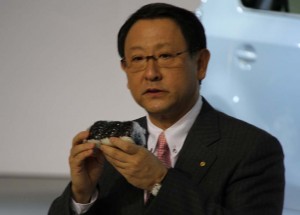It hasn’t been an easy year for Toyota Motor Co., but the maker’s CEO and founding family heir Akio Toyota says he’s confident the worst is over and the rebuilding process begun.
During his first visit to the annual Detroit Auto Show, Toyoda made an onstage appearance helping introduce a new line-up of hybrids that will share the popular Prius brand name. The executive then met with a small group of reporters to discuss the company’s problems and plans, notably including efforts to rebuild its once-sterling image – which has been tattered by a series of safety-related recalls.
“Toyota did receive damage,” Toyota bluntly acknowledged, though he was equally quick to insist that despite ongoing concerns – and a series of lawsuits – the company’s products “are safe.”
“The past year was extra trying,” he said through a translator, though he also insisted that the company did better than might have been expected on a sales front.
Some might question that assessment considering Toyota was the only major maker to post a sales decline in the U.S. for the last three months of the year. Perhaps more telling were the results of a new study by Consumer Reports magazine, which found that the public’s perception of the Toyota brand has dropped substantially over the last year, and is now in a “statistical dead heat” with American rival Ford Motor Co.
The maker has “learned a great deal” from its problems, suggested Toyoda, who said it is enhancing its policy of being “a good corporate citizen.”
To the surprise of some in the automotive media, the executive notably did not mention Toyota’s recall problems during the maker’s Prius introduction. But it was the central subject of his later group interview.
Toyoda noted some of the efforts his company is making to improve its image and rebuild relations with customers. Last week, he announced a new “collaborative” safety research center, to be set up in the Detroit suburb of An Arbor. But he also acknowledged there is “constantly room for further improvement.”
In a curious reach to bridge the language and culture barrier, Toyoda picked up one of the triangular “rice balls,” or onizuri, that are a staple for Japanese fast food fans. He then pointed to a homemade version and said that Toyota would treat its customers by putting “the same heart and soul in each vehicle, just like mothers (do in) their children’s rice balls.”
The maker’s problems have emboldened many of its competitors, some of whom have been able to chip away at Toyota’s sales and market shares. Volkswagen, in particular, recently revealed a corporate goal of becoming the world’s best-seller by 2018.
While Toyoda indicated his confidence his company would eventually rebuild its image and stabilize its market, he insisted “it does not matter” when asked if Toyota hopes to remain the world’s largest automaker. But he quickly added that, “We’ll continue to strive so our efforts result in increased sales.”

